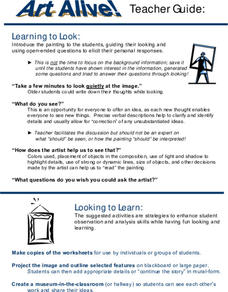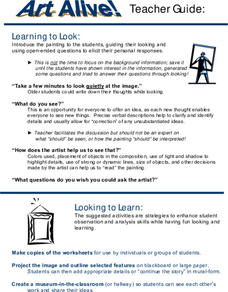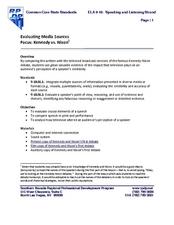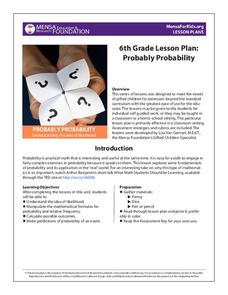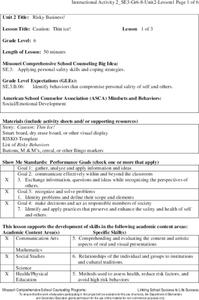Curated OER
Sink or Float
Second graders explore floating and sinking and make predictions about whether certain objects are likely to sink or float. They read the story Who Sank the Boat? by Pamela Allen. Pupils loacate rhyming words and discuss the events of...
Memorial Art Gallery
Art Alive! - Towing a Boat, Honfleur
Color, light and shadow, the placement and size of objects. These are some of the tools artists used to tell their stories. Model for learners how to read a painting by closely examining these features. The richly detailed packet...
Memorial Art Gallery
Art Alive! - Beach at Blue Point
And then what happened? Class members engage in a series of activities that model for them how to read the story in a painting. Participants respond to questions that ask them to closely examine the elements in William Glackens' "Beach...
Curated OER
What's in the Bag?
Help your students identify the attributes of two-dimensional shapes. They read the book Round is a Mooncake, and use pattern blocks to sort shapes. Students sort shapes according to their attributes.
Curated OER
The Human Body
A 'People Scavenge' activity gets learners out of their seat and in search for their peers, in order to discover differences among themselves. Prior to the hunt, students will complete a skit based on a portion of the Bible. The learners...
Curated OER
Improving Speaking Skills in the Language Classroom
How can you create an "English-free" classroom for your foreign language learners? This year, use some of these strategies to maximize your students' opportunity to communicate in the language.
Curated OER
Tomato Exploration
Create tomatoes in 15-20 minutes using this fun and interactive lesson plan! Learners listen to a book about tomatoes (recommendations listed), and focus on the vocabulary word tomato. They count the syllables and practice the plural....
PBS
Exploring Parent-Child Relationships Through Letter Writing
The PBS film, Bronx Princess, launches a study of complex parent-child relationships. Using the provided reading guide, viewers respond to clips from the film and compare Rocky and Yaa’s relationship to other parent-child relationships....
Curated OER
Exploring Owls
What can young scientists discover from dissecting an owl pellet? Explore the owl food chain, beginning with an introduction to these predatory birds. Suggested strategies here include creating a podcast and purchasing a poster, however...
Curated OER
The Giver: Lesson 1
Do “memories need to be shared?" Are “memories…forever?" Would you give up memory to live in a perfect world? Introduce a unit centered on Lois Lowry’s utopian/dystopian novel The Giver with a series of activities that has groups...
Southern Nevada Regional Professional Development Program
Evaluating Media Sources
Just how much influence did television have on the results of the 1960 presidential election? Media critics contend that the results were all about how the two candidates appeared on the screen. Give your young historians a chance to...
Curated OER
The Chosen: Anticipation Guide
"Parents' views on issues should not affect how their children are treated." "Children should respect their parents even if they have different views on issues." Prior to reading chapters 13 through 17 of The Chosen, class members...
Curated OER
Phonics Help: The Phonic Alphabetic Code Chart
Phonics is a fundamental key to reading success. To help your learners with dyslexia or learning disabilities, try using the phonic alphabetic code chart. The chart and full instructions on how it can be used in the classroom are...
American Forest Foundation
Who Speaks for the Trees?
Help young conservationists appreciate the important role that trees play in ecosystems around the world with this collection of six engaging activities. From a shared reading and class discussion of Dr. Seuss' The Lorax, to in an depth...
MENSA Education & Research Foundation
Probably Probability
Reinforce the concept of probability with a series of lessons highlighting the idea of likelihood, probability formulas, relative frequency, outcomes, and event predictions. The collection is made up of four lessons offering informative...
Boston Public Schools
What's in a Biography?
Reinforce research skills, close reading, teamwork, and biographical writing skills with one collaborative instructional activity. Groups create slide shows detailing the elements of a biography through a presentation on a famous...
Cornell University
Constructing and Visualizing Topographic Profiles
Militaries throughout history have used topography information to plan strategies, yet many pupils today don't understand it. Scholars use Legos and a contour gauge to understand how to construct and visualize topographic profiles. This...
Roald Dahl
Matilda - The Third Miracle
Magnus takes a visit to the classroom in the 20th chapter of Matilda. Or does he? After reading, learners interview the person in the hot seat to get a detailed account of what happened during this chapter. Then, they write individual...
Minnesota Literacy Council
Grapes of Wrath and Pronouns
Many regard John Steinbeck's The Grapes of Wrath as the great American novel. The lesson plan combines a variety of strategies, including partner work, independent practice, creative writing, grammar instruction, and small group...
EngageNY
Coda: What Gives This Story Power? Re-Examining Powerful Stories
Writers consider what makes a story powerful as they listen to a short story about Frederick Douglass. Once finished, small groups complete a worksheet to analyze what makes the story so enduring.
Missouri Department of Elementary
Caution: Thin Ice!
Sixth graders listen to a story titled "Thin Ice!" then partake in a whole-class discussion asking and answering questions about what was read. Scholars brainstorm risky behaviors in preparation for a game of RISKO—a game similar to...
Nemours KidsHealth
Healthy Relationships: Grades 6-8
Help middle schoolers develop healthy relationships with a series of activities that teaches them not only to recognize and protect themselves from unhealthy relationships, but also how to develop and maintain positive ones. In addition,...
Facing History and Ourselves
A Contested History
Memories of and interpretations of history change—that's the key takeaway from a instructional activity that has young historians compare the story of the Reconstruction Era as told by the historians of the Dunning School to the view of...
EngageNY
Introducing “Comprehending the Calamity”
Some things are beyond comprehension. Scholars read an excerpt from "Comprehending the Calamity," a primary source text about the 1906 San Francisco earthquake. After identifying the gist, pupils complete anchor charts to analyze how the...
Other popular searches
- Reading Strategies Inferring
- 6th Grade Reading Strategies
- Active Reading Strategies
- Teaching Reading Strategies
- Before Reading Strategies
- 12 Reading Strategies
- Reading Strategies Text Talk
- Early Reading Strategies
- Silent Reading Strategies
- Pre Reading Strategies
- Using Reading Strategies
- 6 Active Reading Strategies



